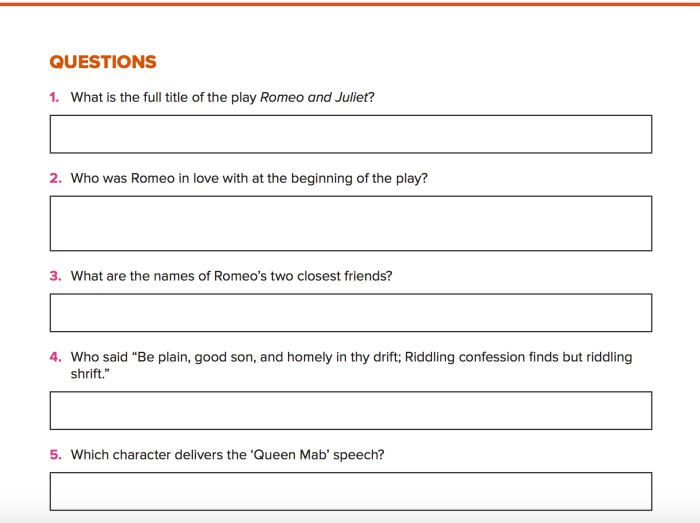Romeo and Juliet Act 4 Questions and Answers PDF provides a comprehensive analysis of the play’s fourth act, delving into its intricate plot, character development, and thematic significance.
This guide offers a thorough exploration of the key events, characters, and literary devices employed in Act 4, enhancing understanding and appreciation of Shakespeare’s timeless masterpiece.
Romeo and Juliet Act 4: A Pivotal Turning Point: Romeo And Juliet Act 4 Questions And Answers Pdf

Act 4 of Romeo and Juliet marks a significant turning point in the play, characterized by pivotal character development, a complex plot, and the exploration of profound themes. This act sets the stage for the tragic events that will ultimately unfold in the play’s conclusion.
Character Development
Romeo: In Act 4, Romeo undergoes a profound transformation. After killing Tybalt in a fit of rage, he is banished from Verona. This banishment forces him to confront his own recklessness and the consequences of his actions. He experiences a range of emotions, from despair to anger, and ultimately resolves to leave Verona and find Juliet.Juliet:
Juliet also undergoes a significant transformation in Act 4. After learning of Romeo’s banishment, she is filled with grief and despair. However, she eventually regains her composure and resolves to find a way to be with Romeo. She seeks the help of Friar Laurence, who provides her with a potion that will make her appear dead.Friar
Laurence: Friar Laurence plays a pivotal role in the events of Act 4. He provides Juliet with the potion that will make her appear dead, and he arranges for Romeo to be sent a message informing him of the plan.
However, his well-intentioned actions ultimately lead to tragedy.
Plot Summary and Analysis, Romeo and juliet act 4 questions and answers pdf
Act 4, Scene 1: Romeo is banished from Verona after killing Tybalt. Friar Laurence provides Juliet with a potion that will make her appear dead.Act 4, Scene 2: Juliet takes the potion and appears to die. Friar Laurence sends a message to Romeo informing him of the plan.Act
4, Scene 3: Romeo receives the message from Friar Laurence and returns to Verona. He finds Juliet apparently dead and, in despair, kills himself.
Themes and Motifs
Love: Act 4 explores the power and intensity of love. Romeo and Juliet’s love for each other is so strong that they are willing to risk everything for it.Fate: The events of Act 4 seem to be driven by fate.
Romeo’s banishment, Juliet’s apparent death, and Romeo’s suicide all seem to be inevitable.Violence: Violence is a recurring motif in Act 4. Tybalt’s death at the beginning of the act sets off a chain of events that ultimately leads to tragedy.
Literary Devices and Techniques
Figurative language: Shakespeare uses a variety of figurative language in Act 4, including metaphors, similes, and personification. These devices help to create a vivid and emotional picture of the events unfolding.Dramatic irony: Dramatic irony is used extensively in Act 4. The audience knows that Juliet is not actually dead, but Romeo does not.
This creates a sense of suspense and anticipation.Soliloquies and asides: Shakespeare uses soliloquies and asides to reveal the characters’ thoughts and emotions. These devices provide the audience with a deeper understanding of the characters’ motivations.
Cultural and Historical Context
Historical context: Romeo and Juliet is set in Verona, Italy, in the 16th century. The play reflects the social and cultural norms of the time, including the importance of family honor and the strict rules governing courtship and marriage.Social and cultural norms: The social and cultural norms of the time shape the characters’ actions.
For example, Romeo and Juliet’s secret marriage is a violation of the social norm that requires parental consent.Relevance to modern audiences: Romeo and Juliet remains relevant to modern audiences because it explores universal themes such as love, fate, and violence.
The play’s characters and story continue to resonate with audiences today.
Expert Answers
What are the key events in Act 4, Scene 1?
Act 4, Scene 1 revolves around the aftermath of Tybalt’s death, with Romeo facing banishment and Juliet mourning the loss of her cousin.
How does Juliet’s character transform in Act 4?
Juliet’s character undergoes a significant transformation in Act 4, becoming more assertive and determined in her pursuit of love.
What is the significance of Friar Laurence’s role in Act 4?
Friar Laurence plays a pivotal role in Act 4, attempting to mediate between the Montagues and Capulets and offering Romeo and Juliet a plan to reunite.